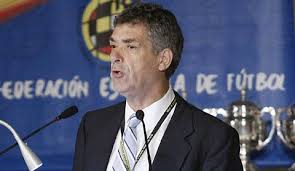By Andrew Warshaw
August 24 – Three weeks before the eagerly awaited UEFA presidential election to replace Michel Platini, Spanish football boss Angel Maria Villar has become the last of the three candidates to unveil his manifesto, promising democracy and transparency if he clinches victory on September 14.
But given his conservative approach and the fact that he is embroiled in an internal spat in his own country, he may need more than more than a few tub-thumping words of self-promotion to convince the majority of UEFA’s 55 members that he is the man to take the organisation forward.
Ever since Platini stepped down after losing his battle to overturn his ban from the game, the canny, highly experienced but distinctly media-unfriendly Villar has been running the show as UEFA’s most senior official.
He says he was asked to run by a number of federations but much of his manifesto focuses on what UEFA achieved under Platini, one of his staunchest allies, along with providing an exhaustive list of his own achievements both as a player and administrator.
When he eventually addresses why he should be the man to take UEFA forward, he says his programme will be based on three pillars.
The first is “the evolution and protection of our organisation towards the best practices of good governance, transparency and democratic participation.”
The others are the development and promotion of football around Europe “guaranteeing equal opportunities for everyone”, and the “protection of the game and the players.”
The reference to good governance is particularly interesting given that Villar was fined CHF 25,000 ($26,000) and rapped over the knuckles last year by FIFA’s Ethics Committee for failing to co-operate with an investigation into the contest to host the 2018 and 2022 World Cups. Whether he likes it or not, such a breach of FIFA’s ethics code, however minor, will not be lost on his critics.
When it comes to specifics, Villar stops short of promising to create an ethics committee for UEFA, a move many have been campaigning for. Instead he says merely that he will: “Strengthen the division and independence of UEFA’s powers and those of its main bodies such as the Congress, Executive Committee, Committees, Control and Disciplinary Bodies.”
Taking a leaf out of FIFA’s book, he also pledges to “separate the political-sporting duties from the administrative functions”, ensure that UEFA’s accounts are made public along with the salaries of the president and other senior officials and “reinforce revenue and expenditure control”.
Despite his notorious resistence to change, he promises to “open the debate” on term limits without, however, providing actual suggestions, and to support women’s continuing participation in the UEFA Executive Committee.
Part of his manifesto, as is so often the case, mirrors the ideas of his two rivals for the position, Dutch football chief Michael van Praag and Slovenia’s Aleksandar Ceferin. The latter slowly appears to be moving into pole position with, he claims, some 20 federation pledges of support including Scandinavian nations who, it is understood, have agreed to support him in return for him backing a joint Scandinavian bid to stage the 2024 European Championship finals.
Contact the writer of this story at moc.l1714187916labto1714187916ofdlr1714187916owedi1714187916sni@w1714187916ahsra1714187916w.wer1714187916dna1714187916

